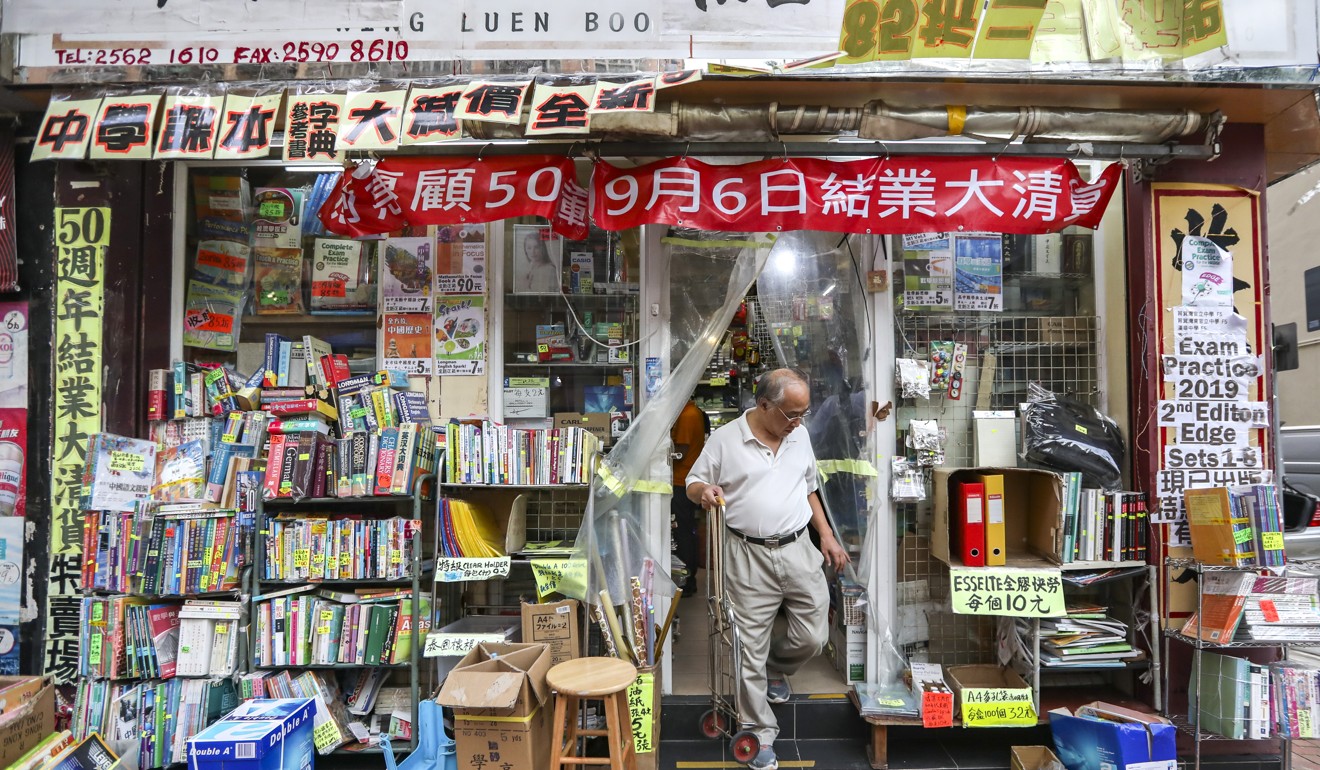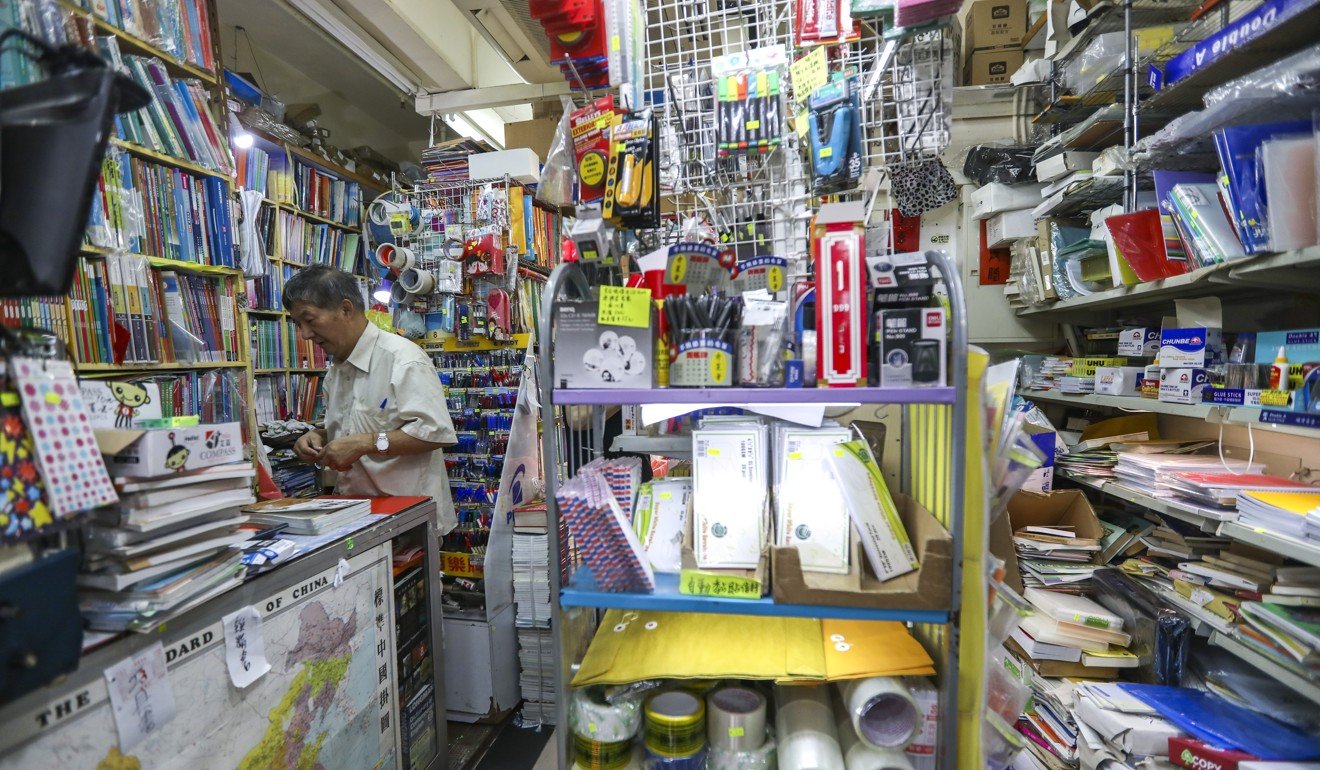
After 50 years, Hong Kong shopkeeper closes Quarry Bay bookstore’s final chapter, faced with crippling rent rise
- Hui Kin-man, of King Luen, cannot stomach HK$30,000 monthly rent, after originally paying HK$750 in 1969
- The 72-year-old’s textbook and stationery shop in Quarry Bay is so small there is only space for one customer to browse at a time
Hui Kin-man, 72, took his time opening his tiny bookstore for business on Friday, the same way he has done for half a century.
But on this occasion, he is deep in thought, recalling the fond memories the shop he is closing for good have given him.
Nestled on a street corner in Island East, King Luen Books and Stationery is so small it only allows one customer to browse at a time.
The walls are hidden behind bookshelves piling up to the ceiling, with a metal stationery rack forming the centrepiece of a cramped, busy environment.

It is the kind of classic bookstore that fills the childhood memories of many Hongkongers.
The shop in King’s Road has been selling affordable textbooks and stationery in Quarry Bay since September 1, 1969, when the first landlord asked for a monthly rent of HK$750 (US$96) for what was then over 500 sq ft of shop space.
Now, the rent is expected to rise to HK$30,000 (US$3,800), which Hui says older, smaller businesses – those typically family-run – can no longer afford.
“So I will just wrap everything up,” Hui says. “This is our fourth and smallest shop.
“We have been paying HK$21,000 per month for it since we rented it in 2014. Now the son-in-law of the original owner has asked for HK$30,000 per month.”
Hui says his eldest daughter would like to find a new place in Island West to continue the family business, but they have not reached a satisfactory deal on rent.
The story behind Quarry Bay, Hong Kong’s original company town
“We will give it a go if the proprietor agrees on HK$20,000 per month,” Hui says.
“Otherwise we will have to trash all the books left behind and I may have to find a new job as a janitor. I won’t get used to a complete retirement.”

Born in the southeastern Chinese province of Fujian in 1947, Hui came to Hong Kong aged 16 in 1962.
He finished his secondary education in high school, and joined the paper product industry to support his family. He later turned his small envelope workshop into a bookstore.
“When the economy is good, we sell more new textbooks. When the economy is bad, we sell more second-hand textbooks,” Hui says. “There is always a way.”
Causeway Bay landlord cuts rent by 44 per cent as Prada closes store
The current store is only half the size of the original one. Space is so scarce that when one shopper squeezes in to browse, others have to wait their turn.
“When we came here five years ago, many in the neighbourhood were moving out due to urban renewal projects,” Hui recalls.
“We were tiding over with the proprietor and we didn’t even formally renew our contract when it expired in 2017.”
Major developers such as Henderson Land and Swire Properties made bold acquisitions of old residential and industrial buildings in Quarry Bay for redevelopment in 2014.
Tiffany says protests ‘taking a toll’ on its Hong Kong business
At the time, the quiet district was perhaps only well known for hosting Hong Kong Funeral Home. But now it has turned into an extension of the class-A office space hub in Tai Koo.
The outlook for Hui and his shop has changed quickly in the past year after the old proprietor passed away and the next generation took over.
Meanwhile, there was an influx or white-collar workers and new shopping complexes sprouted.

“Small and independent shops relying on community business can hardly hold the fort,” Hui says. “Some groceries and restaurants have gone.”
Gone also are some of his most endeared customers.
“There used to be a boss of a printing factory, surnamed Chiu,” Hui recalls, while looking into the distance with a smile.
“He often asked me to have lunch with him and he always ordered a plate of barbecue pork. When it was Lunar New Year, he would give each of my three children HK$500 as lucky money.”
China’s biggest cities see office glut as trade war saps expansion plans
Other than developers, another irresistible force in Hui’s way comes from the largest and state-owned publishing and distributing network in Hong Kong, Sino United Publishing.
“Since the group controls both publishing and sales, their publishing houses would give us a more stingy discount so our profits were squeezed,” Hui says.
To make ends meet, Hui’s shop sell both new and second-hand textbooks. “Students used to be more frugal and concern less about used books,” he adds.
“Nowadays, with government subsidies, many families can afford new books.”
By August 28, the government had granted a total of HK$558 million (US$71 million) to more than 150,000 primary and secondary school students under this year’s textbook assistance scheme.
Theme souvenir store at space museum shutters after losing renewal bid
Hui also bears witness to different attitudes among young people over the years, describing students nowadays as “more spoiled”.
“Many don’t even come to the bookstore,” he says. “Instead, they stay in touch with their parents on phone and tell them what to buy.”
If there was a choice, Hui might not close his shop, although the business was never lucrative.
“I am somewhat reluctant,” he says. “It’s really satisfying when the neighbourhood gives me business.”
The self-taught businessman says he has been standing firm on “asking for a lower price from the suppliers instead of asking for a higher price from the customers”.
Outlook for retail rents weighed down by trade war, protests
“How can I always get a better offer from the suppliers?” Hui asks. “I respect all salesmen and treat them nicely all the time.”
Looking back over the 50 years, Hui says he never considered going big or giving up.
“I know who I am and I sell what I have,” he says.

